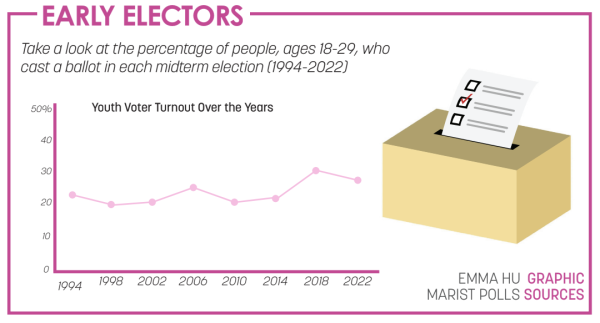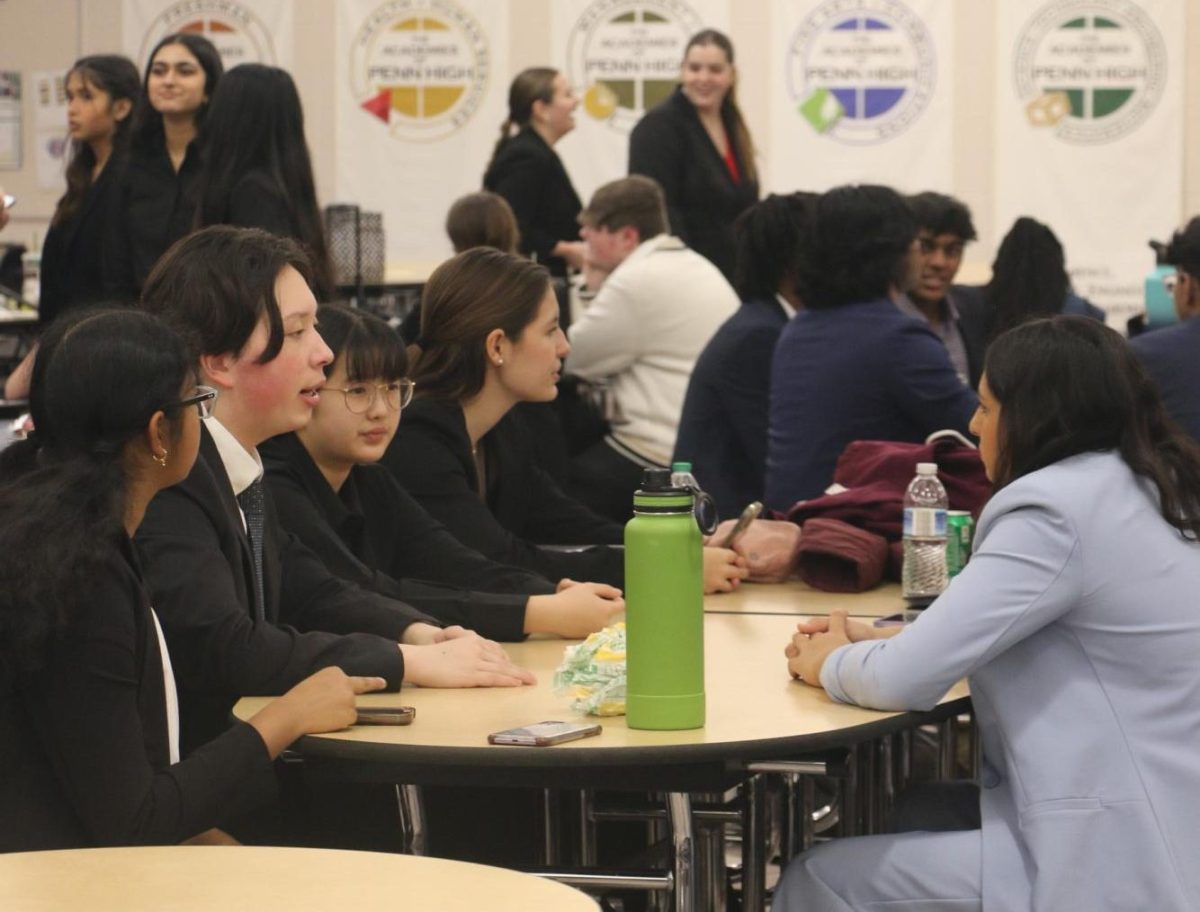Two years ago, The New York Times reported that less than 50% of 18 to 24 year olds did not vote. This created a nearly 15-point difference when compared to the turnout. Younger people don’t vote because they’re not used to it, as stated by Eric Putzler, a political scientist at Penn State. This creates “non-habitual voters.” However, in comparison, according to the National Public Radio, data from November 2022’s midterm elections, shows that 27% of the ballots cast were from the 18 to 24 age group—the second highest turnout in thirty years. This especially increasing in battleground states, including Florida, Georgia and North Carolina. At CHS, students can gain more information about voting and are more likely to cast a vote in upcoming elections. Yet, senior Ben Boyce has a different opinion about this.
“I actually think that there is a decrease (in the want to vote). But in terms of younger people, there is a big problem with youth voter turnout. For example, Indiana has the third lowest rate of 18 to 24-year-olds voting, and I think it was about 14.6% of people 18 to 24-year-olds voted in the last election. Which is just very low compared to even a lot of other states,” he said.
Although there can be several different reasons for this low turnout rate, such as access to polling and an individual’s knowledge about voting itself, Boyce thinks this low voter turnout rate is something else. He said he believes it is due to an increase of apathy,
“It is a lot of apathy. First of all, I think that our political polarization has grown over the decades. It just seems that politicians are getting nothing done. Both parties are very divided so I think that a lot of young voters have seen that and therefore have made the decision not to vote because either their vote isn’t going to count, or even if they do vote nothing is going to come of it,” he said.

According to the Pew Research Center, in 1994 only 4% of individuals viewed each political party negatively. Now in 2023, that number has spiked to 28%. Along with this, in 2023 only 16% of Americans trust the federal government most of the time.
At CHS, history teacher James Ziegler teacher comments on this decrease of trust in the government,
“When we start looking at some of the major issues that are impacting us as a society today whether it’s at a local state national level a lot of times that’s impacting you know- if you’re not voting you’re not really having to say in in those policies. Voting is one of the only major ways we as citizens can hold our representatives accountable,” he said.
This decrease of trust within the government, causes individuals to say somewhat radical things. Along with this, some say it can even be damaging to democracy. Boyce states his opinion on this,
“It’s dangerous for democracy because like people are- if you have the most outspoken people in both edges of the parties voting. Like if you just have those people voting, first of all, nothing is going to get done and second of all the elected officials are not actually going to represent the will of the people,” he said. “I’ve just kind of seen that happening and it’s difficult to just sit in the sidelines and see that happening and not take action.”
Although these statistics may be painting a negative view, according to Pew Research Center in the 2020 presidential election, it was the highest turnout rate in the United States since 1900. Senior Kate “Katie” Russell shares her opinion on this,
“It can be hard to feel like your voice is going to be heard because there are just so many people voting. It’s easy to think that, “Hey if I don’t vote it doesn’t really matter because so many other people voting,” she said.
CHS has incorporated several things within the school to help students who are of age to participate in elections to vote. You can see this on the library TV screens, and even on the school announcements. Additionally, several social studies teachers advocate for their students to share their opinions about topics by voting. Ziegler talks about his engagement with voting within his classes,
“I even just noticed that in my classes too it seems like a greater sense of engagement, people understanding a little bit earlier I think you know how important these issues are to them and that they need to kind of get involved at an early age,” he said, “So that is one thing that I do think since my time teaching and this is my 13, 14th year or something like that I do kind of feel like there’s been a greater sense of importance associated with this amongst your generation right now and not just in terms of understanding maybe a little bit more of an importance of voting but literally getting involved boots on the ground.”
Following this, many individuals are getting involved in voting. Especially even working on campaigns for politicians or even working at the polls. Ziegler said that he has a lot of individuals in the African American Culture Club involved, as well as in his IB History course. Even Boyce actively involves himself with these things and shares his experiences.
“I’ve worked on two, a Statehouse campaign and City Council campaign, in addition, I’ve worked on voter registration drive here (CHS),” he said.
He continues by saying it was an eye-opening experience, which allowed him to find a deeper understanding of why individuals may not vote.
Zielger and Boyce both want to see CHS students turn out in local elections. Russell shares her opinion on this, and what will happen if you do not vote.
“I think it’s important to vote for what you believe in and if you want to see change or create change I think you need to vote and make your opinion heard because nothing is going to change if you don’t change it,” she said.

































![AI in films like "The Brutalist" is convenient, but shouldn’t take priority [opinion]](https://hilite.org/wp-content/uploads/2025/02/catherine-cover-1200x471.jpg)









































![Review: “The Immortal Soul Salvage Yard:” A criminally underrated poetry collection [MUSE]](https://hilite.org/wp-content/uploads/2025/03/71cju6TvqmL._AC_UF10001000_QL80_.jpg)
![Review: "Dog Man" is Unapologetically Chaotic [MUSE]](https://hilite.org/wp-content/uploads/2025/03/dogman-1200x700.jpg)
![Review: "Ne Zha 2": The WeChat family reunion I didn’t know I needed [MUSE]](https://hilite.org/wp-content/uploads/2025/03/unnamed-4.png)
![Review in Print: Maripaz Villar brings a delightfully unique style to the world of WEBTOON [MUSE]](https://hilite.org/wp-content/uploads/2023/12/maripazcover-1200x960.jpg)
![Review: “The Sword of Kaigen” is a masterpiece [MUSE]](https://hilite.org/wp-content/uploads/2023/11/Screenshot-2023-11-26-201051.png)
![Review: Gateron Oil Kings, great linear switches, okay price [MUSE]](https://hilite.org/wp-content/uploads/2023/11/Screenshot-2023-11-26-200553.png)
![Review: “A Haunting in Venice” is a significant improvement from other Agatha Christie adaptations [MUSE]](https://hilite.org/wp-content/uploads/2023/11/e7ee2938a6d422669771bce6d8088521.jpg)
![Review: A Thanksgiving story from elementary school, still just as interesting [MUSE]](https://hilite.org/wp-content/uploads/2023/11/Screenshot-2023-11-26-195514-987x1200.png)
![Review: "When I Fly Towards You", cute, uplifting youth drama [MUSE]](https://hilite.org/wp-content/uploads/2023/09/When-I-Fly-Towards-You-Chinese-drama.png)
![Postcards from Muse: Hawaii Travel Diary [MUSE]](https://hilite.org/wp-content/uploads/2023/09/My-project-1-1200x1200.jpg)
![Review: "Ladybug & Cat Noir: The Movie," departure from original show [MUSE]](https://hilite.org/wp-content/uploads/2023/09/Ladybug__Cat_Noir_-_The_Movie_poster.jpg)
![Review in Print: "Hidden Love" is the cute, uplifting drama everyone needs [MUSE]](https://hilite.org/wp-content/uploads/2023/09/hiddenlovecover-e1693597208225-1030x1200.png)
![Review in Print: "Heartstopper" is the heartwarming queer romance we all need [MUSE]](https://hilite.org/wp-content/uploads/2023/08/museheartstoppercover-1200x654.png)




